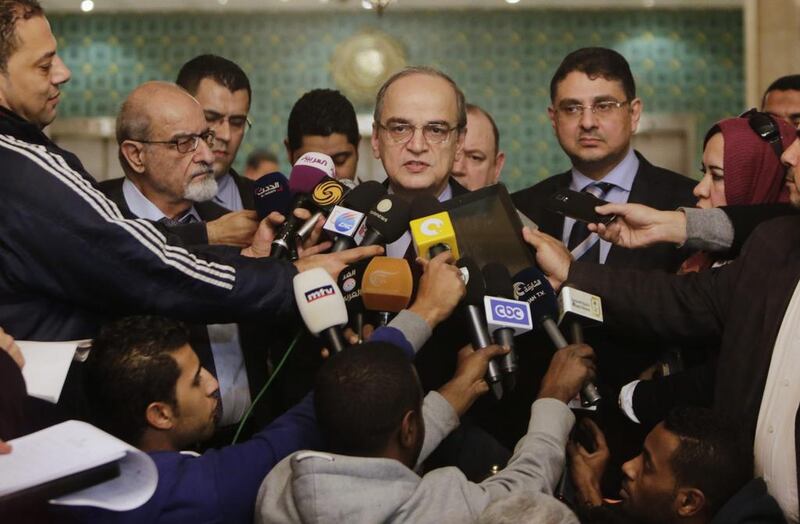BEIRUT // The western-backed Syrian opposition on Saturday rejected moves by Russia to restart peace talks with the Bashar Al Assad regime, saying it was not a “clear initiative”, while Syria indicated that it was willing to take part.
Hadi Al Bahra, head of the Turkey-based opposition Syrian National Coalition, met the Arab League chief Nabil Elaraby in Cairo on Saturday and told a news conference that “there is no initiative as rumoured”.
“Russia does not have a clear initiative, and what is called for by Russia is just a meeting and dialogue in Moscow, with no specific paper or initiative,” he was quoted as saying by the Egyptian state news agency Mena.
“We can’t give a response to something that’s still hanging in the air,” Mr Al Bahra said. “There are no invitations, and what are they inviting us to? Is there a negotiations framework? Who will come? What is the aim?”
Syrian state television on Saturday quoted a source at the foreign ministry as saying “Syria is ready to participate in preliminary consultations in Moscow in order to meet the aspirations of Syrians to find a way out of crisis”.
Moscow, an ally of the Mr Al Assad, has pushed to restart talks that collapsed in Geneva in February.
The Russian foreign minister Sergei Lavrov said this month that he wanted Syrian opposition groups to agree among themselves on a common approach before setting up direct talks with the Damascus government.
But Mr Lavrov did not specify which opposition groups should take part. Some opposition groups are tolerated by Damascus but shunned by the opposition in exile.
Russia has long backed Mr Al Assad, including with arms supplies for Syria, but he has become a more important ally for Moscow since the 2011 Arab Spring protests toppled several autocrats in the Middle East, some of whom had close ties with Moscow.
Earlier this year the Syrian National Coalition and other opposition groups met Syrian government representatives in Geneva.
But they collapsed as the opposition demanded Mr Al Assad’s resignation, while the regime insisted the main focus of the negotiation should be on fighting “terrorism”.
Since then, some opposition figures have suggested that a deal could see Mr Al Assad remain in power for a limited time.
The change in tone reflects growing concern over advances by Ilsamist rebels who have expelled more moderate opposition rebels from large areas.
Foreign fighters have flocked to join Al Qaeda-linked militants and the extremist group ISIL, which led an offensive that seized large parts of Syria and Iraq, committing widespread atrocities.
A monitoring group said on Saturday that ISIL had lost ground in the Syrian town of Kobane, with Kurdish fighters now controlling more than 60 per cent of territory.
The strategically located town on the border with Turkey has become a major symbol of resistance against ISIL.
The extremist group launched a major offensive in mid-September to try to capture Kobani, and at one point controlled more than half of the town, known in Arabic as Ain Al Arab.
But supported by US-led airstrikes and reinforced by Kurds from Iraq, “Kurdish forces now control more than 60 percent of the city”, said Rami Abdel Rahman, director of the Britain-based Syrian Observatory for Human Rights.
“ISIL has even left areas that the Kurds did not enter for fear of mines,” he added.
A Kurdish activist from Kobani, Mustefa Ebdi, said the Kurdish militia defending the town had advanced eastwards on the frontline during the past week.
ISIL has withdrawn from the seized Kurdish militia headquarters in the north of the city, as well as from southern and central districts.
“The Kurdish advance is due largely to the airstrikes by the coalition,” said Mr Ebdi.
The ISIL militants were “now using tunnels after failing in their tactics of car bombs and explosive belts”, he said.
Dozens of ISIL fighters have carried out suicide bomb attacks in Kobani in the face of fierce Kurdish resistance.
More than 1,000 people are reported to have been killed in the battle for the town, most of them militants.
The US military central command on Saturday said it conducted 13 airstrikes in Kobani on Thursday, targeting 17 ISIL fighting positions, as well as buildings, staging areas and a vehicle.
The military command corrected an earlier tally of 31 strikes that it said were carried out in Syria and Iraq on Friday, saying there were a total of 39 strikes launched on Thursday and Friday.
Another 12 strikes were launched on Saturday, it said.
* Reuters with additional reporting by Associated Press and Agence France-Presse





